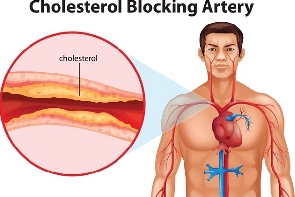Cholesterol is a needed to build healthy cells, but high levels of cholesterol can increase risk of heart diseases. Increased cholesterol is a contributing factor for fatty deposits in your blood vessels.
These deposits eventually narrow the lumen of blood vessels making it enough blood flow through your arteries difficult. Unhealthy lifestyles choices often results in High cholesterol despite the fact that it can be inherited.
It can be prevented by taking in a healthy diet, regular exercise and sometimes medication as treatment can help reduce high cholesterol.
Risk factors
Factors that can increase your risk of unhealthy cholesterol levels include:
Unhealthy diet.
Eating too much saturated fat or trans fats can result in unhealthy cholesterol levels. Saturated fats are found in fatty cuts of meat and full-fat dairy products. Trans fats are often found in packaged snacks or desserts.
Obesity
Having a body mass index (BMI) of 30 or greater puts you at risk of high cholesterol.
Lack of exercise
Adequate exercise helps boost your body's HDL, the "good," cholesterol.
Smoking
Cigarette contains nicotine that raises the bad fats thus smoking may lower your level of HDL, the "good," cholesterol.
Alcohol
Drinking alcohol raises the triglycerides and cholesterol in your blood. If your triglyceride levels become too high, they can build up in the liver, causing fatty liver disease. The liver can't work as well as it should and can't remove cholesterol from your blood, so your cholesterol levels rise.
Age
Even young children can have unhealthy cholesterol, but it's much more common in people over 40. As you age, your liver becomes less able to remove LDL cholesterol.
High cholesterol can cause a dangerous accumulation of cholesterol and other deposits on the walls of your arteries (atherosclerosis). These deposits (plaques) can reduce blood flow through your arteries, which
can cause complications, such as:
Chest pain (Angina). If the arteries that supply your heart with blood (coronary arteries) are affected, you might have chest pain (angina) and other
symptoms of coronary artery disease.
Heart attack. This can be as result of plaques tear or rupture, a blood clot can form at the plaque-rupture site thus blocking the flow of blood or breaking free and plugging an artery downstream. If blood flow to part of your heart stops, you'll have a heart attack.
Stroke. Similar to a heart attack, a stroke occurs when a blood clot blocks blood flow to part of your brain.
Prevention
The same heart-healthy lifestyle changes that can lower your cholesterol can help prevent you from having high cholesterol in the first place. To help prevent high cholesterol, you can:
Eat a low-salt diet that emphasizes fruits, vegetables and whole grains
Limit the amount of animal fats and use good fats in moderation
Maintain a healthy weight
Quit smoking
Adequate exercise for at least 30minutes on most days of the week
Alcohol intake should be in moderation, if at all
Effective stress management
Health News of Tuesday, 7 March 2023
Source: Augustt Daniel

















